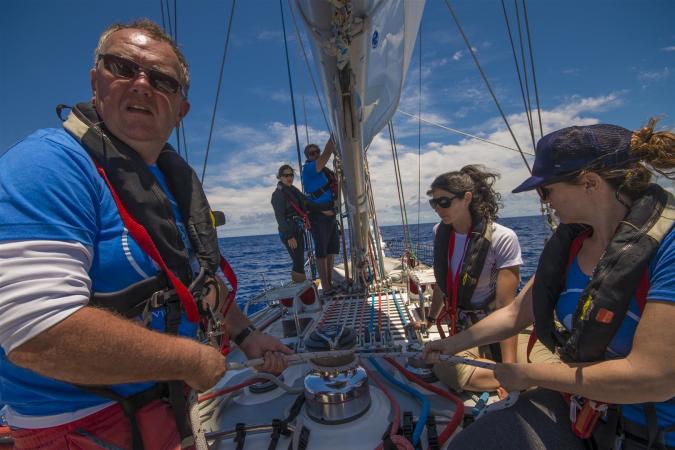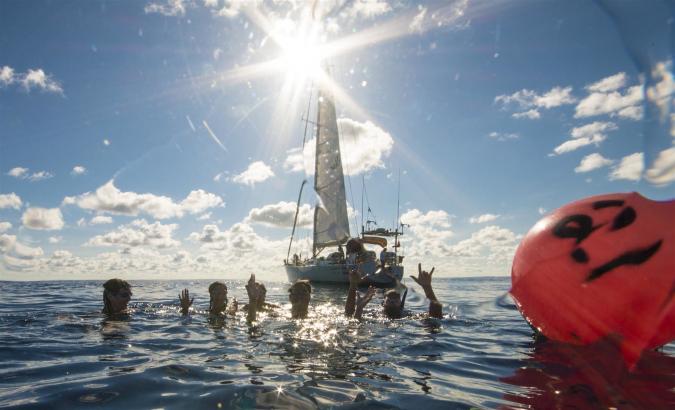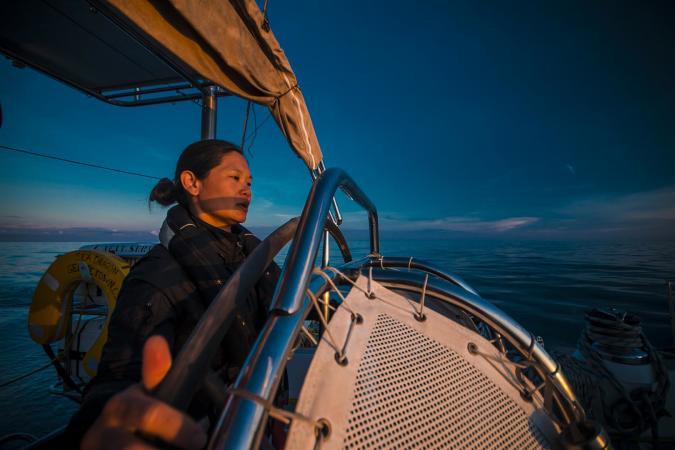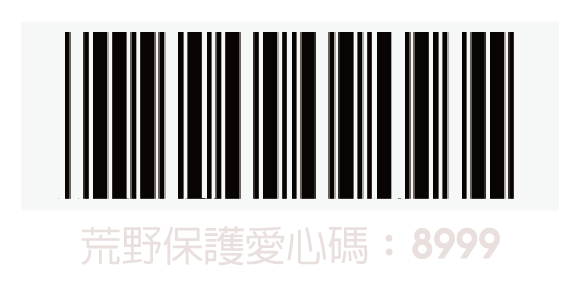從百慕達到冰島──改變我一生的海上旅程
Viking Voyage from Bermuda to Iceland - a trip that changed my life
從百慕達到冰島──改變我一生的海上旅程
文、圖/La Benida Hui許沁雯(荒野保護協會志工、海洋展覽策展人)
翻譯/柯典一、劉青英(自然名:青鳥)
I stood on deck and looked up at the towering mast above me surrounded by my new family for the next 21 days. This 72 foot moving island was to be my home and shelter where I would eat, sleep, and bathe below the ocean surface. The idea of being "unplugged" from the world in the middle of nowhere to travel 1600 miles to understand micro plastic distribution thrilled me. We spent two days prepping for our departure, stocking up on food, running though emergency protocol and familiarizing ourselves with all the boat parts and names. We squeezed in a last minute beach survey at a nearby location to collect more plastic samples for surface data and had our last restaurant meal with cake for dessert and a birthday song for a crew member.
我站在甲板上,抬頭看著高聳入雲的桅杆,四週圍繞著我未來21天的新家人。這座72英尺長的移動島嶼,是我吃飯、睡覺和洗澡的家與避風港。一想到「脫離」熟知的世界,航行1600英哩到無人之境,調查微塑膠的分佈,就感到非常興奮。出航之前,大夥花了兩天準備航行物資,包括裝滿食物、演練緊急處理程序、熟悉船舶各部份與名稱。最後還擠出一些時間去附近海灘調查,收集塑膠樣本列入地面數據資料,還到餐廳享用出航前最後的陸地美食,佐以蛋糕甜點,外加祝福一位新船員的生日快樂歌。
The first few days in open water were spent developing our sea legs. A handful of us including myself did get sea sick. We were divided into teams of three with a crew "on duty" 24/7 for three to four hour shifts depending on whether it was day or night. This was our only "scheduled appointment" when our team members took turns cleaning, cooking or conducting visual observation and research. We slept when we were tired and ate according to who was on lunch or dinner duty.
出海後的前幾天都在適應海上的生活,大多數的同伴包括我在內,都備受暈船之苦。因輪班需要,所有人分成三組,24小時都有人輪班「值勤」,每次值勤三或四小時,依晝夜而不同。這是唯一的「班表任務」,當班時就清潔打掃、煮餐點、目視觀察及研究。其他人覺得累就睡覺,吃飯就看當時的值班狀況。

Memorable moments were marine cetacean sightings that included whales and dolphins, phosphorescent seas that turned the ocean into a live light show at night, swimming with Barracudas when the ocean was dead calm, fishing for a tuna lunch/dinner and the 10 long days of fog……
印象最深的時刻,是看到鯨魚與成群海豚、浮游生物把夜晚的海面點綴的像一場螢光秀、海面平靜時下海與成群的梭魚游泳、釣鮪魚當佳餚、還遇過一連十天的大霧。
This is when the cold really set in, off the Grand Banks of New Foundland where a cold current came and stayed along with coast guard warnings of ice bergs. Night and Day were the same thick grey there were no stars and no sun. Some days came with icy rain and soon almost all of us remained below deck on our breaks huddled by the radiator covered in wet gloves and socks. Relief and comfort came in the form of a hot drink made during our shifts with the occasional freshly baked bread or a piece of chocolate. We learned to appreciate the little things.
等航行到加拿大東邊紐芬蘭東南角的大淺灘(Grand Bank),就是北方寒冷洋流來的區域,沿途可看到海岸防衛隊的冰山警告標誌。當濃霧籠罩時,白天與夜晚是看不到太陽或星星的。有些日子下著冰雨,一到休息時間,大家都立馬到甲板下,依偎在烘著溼手套、襪子的暖氣旁,喝著值班時所做的熱飲,偶爾搭配剛出爐的麵包或一塊巧克力,我們學會了感謝這些小確幸。
The top three things I missed the most besides my family was living life vertically (as opposed to a 45 degree angle), a proper shower/toilet and oddly enough I really started to miss land. Not so much "home" but solid ground. This is what struck me, I may be steering the boat but Mother Nature was steering us, not to our "home -land" but to land. This became my greatest lesson on this journey, understanding the bigger picture of "home". My floating home, my family crew was my community, my neighbor was the ocean and all the living creatures in it just as much as the birds, the countries we passed, the stars we gazed at, are all a part of the "home" planet; and there was only one.
除了家人之外,我最懷念的三件事是直立的生活(而非45度),正常的淋浴與上廁所,很奇怪的是我開始懷念陸地了,不是自己的「家」,而是不會晃動的陸地。最震撼的是我在掌舵時,感覺真正的舵手是大自然,它引領我們到陸地,不是「家鄉的陸地」,這就是此行最重要的課程——了解那個更宏觀的「家」。我這浮動的家,如家人般的船員是社區,大海是鄰居,所有在其中的生物與海鳥,所經過的國家,凝視過的繁星,都是這個「家」星球的一份子,而且是我們唯一的家。
We are all connected. The samples we collected in the middle of the ocean contain plastic. Plastic that made its way from land pushed by the ocean currents to become food or a life threatening hazard to the marine life that eventually travels up the food chain causing damage to our personal health and our ocean environment.
我們都是互相連結的,大海中所採集的樣本含有塑膠。原本在陸地上的塑膠落海後,經由洋流帶到各地,成為海中生物的食物或是致命危險物,最終進入食物鍊,傷害人類的健康並破壞海洋環境。

The marine biologist and explorer Sylvia Earle summed this up in a simple quote, "No water, no life. No blue, no green."
海洋生物學家與探險家 Sylvia Earle 下的結論「沒有水,就沒有生命;沒有藍(海水),就沒有綠(植物)」。
So, my plan is to continue my plastic journey educating the public through programs I am involved in, art projects and partnerships I work with including scientists and artist in the environmental field. I hope you will find the inspiration you need to join me and be involved with caring for our future.
Many thanks to the host of our Viking Voyage, NGO 5 Gyres (www.5gyres.com), Skipper Phil for keeping us in line and bringing us safely "home", my St Cassiopeia team and rest of the "family" crew, to Society of Wilderness for being a part of my Taiwan "home", last but not least my parents and Andy for their love and support.
所以,我打算繼續塑膠旅程,透過我所參與的計劃、藝術企劃、跟環境相關領域的科學家及藝術家成為夥伴,來教育公眾。希望你能找到激勵的動機與我同行,一起關心我們的未來。謝謝Viking Voyage、NGO 5 Gyres (www.5gyres.com)、Phil船長的領導並且平安帶我們回「家」、我的St Cassiopeia團隊、其他的「家人」船員、我在台灣的「家」——荒野保護協會,當然還有我的父母和Andy所給的愛與支持。
La Benida Hui(許沁雯)網站:www.rareawareness.com
| 附加檔案 | 大小 |
|---|---|
| 荒野快報272期第12~13頁 | 2.38 MB |



